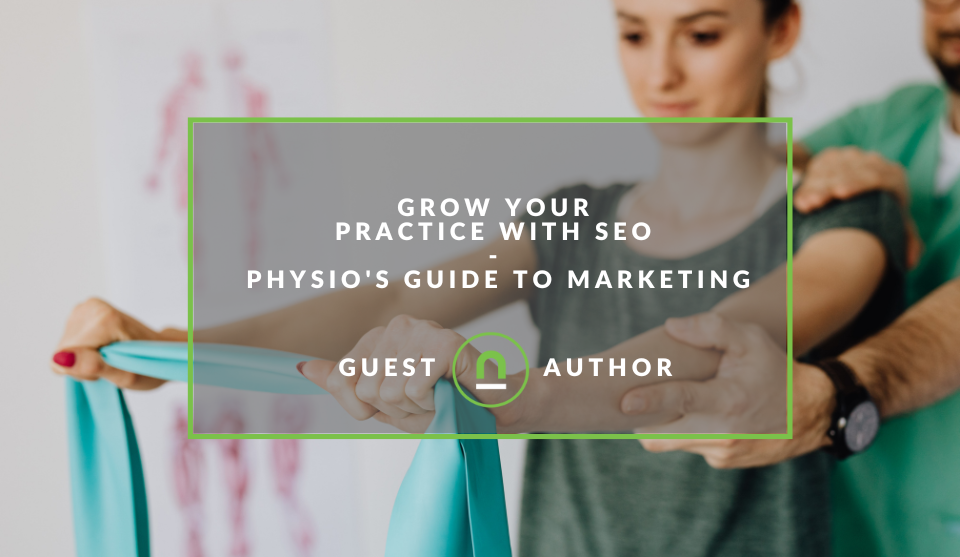Recent posts

Doctors Orders
Grow Your Practice With SEO - Physio's Guide To Marketing
28 October 2025

Doctors Orders
How To Grow Your Chiropractor Practice
27 October 2025

Press Releases
Cape Town Welcomes the World - Volleyball World Beach Pro Tour Officially Opens in South Africa
24 October 2025

Money Talks
How to Choose the Best Forex Copy Trade Service in South Africa
21 October 2025
Popular posts
Extravaganza
Trending Music Hashtags To Get Your Posts Noticed
24 August 2018
Geek Chic
How To Fix iPhone/iPad Only Charging In Certain Positions
05 July 2020
Extravaganza
Trending Wedding Hashtags To Get Your Posts Noticed
18 September 2018
Money Talks
How To Find Coupons & Vouchers Online In South Africa
28 March 2019
Grow Your Practice With SEO - Physio's Guide To Marketing
28 October 2025 | 0 comments | Posted by Nathan Meyer in Doctors Orders
Physiotherapy serves many segments, whether it's patients looking for urgent care, help with a sports injury or even advice, they all search for different services that link to physiotherapy. Optimising this is not only vital for ranking on Google, but also for converting visitors into customers who walk into your practice.
Physio SEO makes your physiotherapy practice easy to find and even easier to book. Speed up your mobile pages, build clear service, condition and suburb pages, and optimise your Google Business Profile so you show up when patients search. Real photos, fresh reviews, and simple online booking turn visitors into appointments you can count on.
Key Takeaways
Start with GBP and Reviews, ship high-intent pages, make booking effortless on mobile, and measure what books. Iterate monthly, and SEO becomes a reliable pipeline of real patients through your door.
Optimise Your Local Presence
To get more patients with physio SEO, your first step should be reeling in those patients closest to your practice. For in-person practices, success is measured in booked appointments. Local SEO allows nearby patients to find, trust, and book physiotherapy.
Google Business Profile
Your Google Business Profile is your primary local listing and the first step in physio SEO. It should answer key questions instantly and make booking effortless.
Optimising your Google business profile fuels your local search ranking. Proximity, relevance, reviews, photos and completeness are core to ranking on Google Maps. A complete, active GBP directly improves your visibility where it matters.
Because your Google Business Profile is the first thing that online customers will see, they need to know that you are trustworthy immediately. You can include ratings, recent reviews, images, hours and "open now" to push patients to booking.
A consistent name, address, phone (NAP), categories and services on GBP become the reference point that other directories and Google use to verify your clinic.
It's also scalable if you have multiple clinics. Each site can have its own optimised listing, avoiding duplication and making suburb coverage credible.
Reviews
A steady flow of genuine reviews is hard for competitors to copy. On top of that, prospective customers trust patients more than ads. If a real patient is giving their experience of your service, it's more likely to attract them to your practice over a competitor. Thus, it's a key part of optimising local SEO.
By making it effortless to leave feedback through QR codes, follow-up messages, and one-tap review links, you turn positive experiences into visible proof of quality.
Landing Pages by City or Suburb
Here, you want to answer nearby customers' questions as concisely as possible. Lead with a clear H1 that includes the place name, confirm in the first line that you're a local physiotherapist, and put "Book Now" high on the page alongside address, hours, a live map, parking and public transport notes.
Use the phrases people actually type (e.g., "Physiotherapist in Southern Suburbs") and name the exact suburb where relevant ("Physiotherapist in Rondebosch," "Physiotherapist in Claremont," "Physiotherapist in Midrand").
Local Citations
Local citations are consistent listings of your clinic's name, address and phone on trusted sites. They help search engines confirm you operate where you say you do, improving map visibility and patient confidence.
Prioritise Google and Google Maps, then add reputable South African directories such as PhysioInfo, Medpages, RecoMed and Health4You. Match every detail exactly to your website footer, including phone format and booking link.
Audit these listings regularly. Even small mismatches create confusion for patients and Google. Clean, consistent citations strengthen your eligibility for Map Pack results.
Imagery
Use welcoming photos to build trust. You can include images of your building exterior with signage, entrance, reception, treatment rooms, team portraits and key equipment. Keep lighting natural and branding consistent. If you're a mobile physio, try to show a tidy in-home set-up.
Target the Right Keywords?
Win the right searches, not just more searches. Growing your practice in this regard means obtaining visitors who actually convert into bookings.
Search Ranking Volumes
The keywords you choose to build your site content around should have meaningful search volumes to ensure that there is an actual basis for including them.
Brand Searches
Customers searching specifically for your brand likely already have an idea of the services you offer, but often, they are not fully on board in terms of trustworthiness.
Fresh reviews and consistent details will engage your customer base and capture this high-conversion-rate audience.
"Near me" Queries
Most patients in pain type "physio near me" or "physiotherapist near me" on their phones. Win those moments with a complete Google Business Profile, fast-loading local pages, and clear CTAs. Proximity plus clarity drives the booking.
You can layer intent with natural variations like "sports physio near me," "post-surgery physio near me," or "lower back pain physiotherapist near me." Keep phrasing human and readable.
Location-based Queries
People also search by city, with phrases such as "physiotherapist Cape Town" or "physio Johannesburg." Build local pages that prove you're there with local landmarks and parking details. Keep the copy unique per suburb to avoid thin or duplicate content.
Service-type Searches
When it comes to less urgent treatments, such as for mild sports muscle injuries, patients often already have a method of treatment in mind.
You can create focused service pages that explain your approach in plain English, introduce the clinicians who deliver it, and link directly to booking, WhatsApp, and relevant condition guides.
Ailment Searches
More urgent searches are also problem-led. These can include "rehab after ACL surgery," "stroke recovery physiotherapy," or "back pain exercises physio."
In this case, you want to cover the assessment, typical timelines and next steps, and include a gentle prompt to book or message for personalised guidance.
Referral-based Terms
Physiotherapy is frequently doctor-recommended, so targeting referral-based terms is a useful strategy. Patients search terms like "post-surgery physio Cape Town" or "doctor-referred physiotherapist." Build confidence with credentialed clinician bios, relevant hospital affiliations, and clear care pathways.
Corporate Wellness Searches
To capture businesses that require physio services for their employees, you can orient pages around "workplace ergonomic assessment" and "corporate physio services."
Create a dedicated page outlining on-site screenings, desk set-ups and return-to-work support, with clear contact options for HR and a simple "Request a proposal" form.
H2: Optimise Existing Website On-Page SEO
On-page SEO for physiotherapists means structuring each page so Google and nearby patients immediately see what you treat, where you're based, and how to book.
H1s and Headings
Use a single, benefit-led H1 that matches your goal, then structure the page with clear H2s and H3s. State the service, location and outcome in plain English so patients can skim and decide.
Internal Links
Use natural, descriptive internal links to move readers from learning to booking. Point blogs and exercise guides to the relevant condition page, then on to the service page and booking. Review older posts quarterly and add links wherever they help patients take the next step.
Mobile Friendly Sites
Patients search on the move, and Google evaluates your site primarily on its mobile experience. Fast, crawlable pages with clear intent signals rank and convert better.
Prioritise Core Web Vitals and keep critical content server-rendered. Use lean HTML, compress images, lazy-load below-the-fold assets, and minimise blocking scripts to improve render time and crawl efficiency.
Build An Easy Booking System for Physio SEO
Optimising Physio SEO ensures your customers can act on their search intent. Even if they're on your website, they may be hesitant and bounce if booking is difficult or slow.
Bookings for Mobile Physiotherapists
If you're a travelling physio, use a short enquiry form titled "Book a home visit in [Suburb]" and ask only for name, contact details, suburb and preferred time.
Set expectations with a friendly note on response times and coverage areas, then confirm via WhatsApp or a quick call.
Clear Booking Actions
Add a visible online booking calendar or a clear call button. Keep it on key pages, show today's and tomorrow's availability, and add one-tap click-to-call for those who prefer to speak to someone. Send instant confirmations and reminders so the decision feels complete.
Use Your Network for Backlinks
Backlinks are a core part of off-page SEO. The trust and authority signals that live beyond your website; influence your rankings and how much patients trust your clinic.
Collaborate Related Industries
Partner with credible health and wellness publishers. Contribute useful quotes, brief de-identified case snapshots, and clear, patient-friendly guidance. Pitch topics that solve their readers' questions, and link to a genuinely valuable resource on your site.
Why Backlinks Matter
A few high-quality, relevant editorial links from trusted sites can boost rankings for competitive local terms and drive steady referral traffic. Prioritise quality over volume and use natural anchor text.
Capturing leads with Conversion rate optimisation
Conversion rate optimisation (CRO) turns your existing traffic into bookings. In practice, that means more appointments from the same visitors, without extra ad spend.
Prioritise high-intent pages
Prioritise the pages where patients are most ready to book and watch conversions climb. Start by optimising high-intent landing pages. Mirror the exact service and suburb in the H1, add a short testimonial beside the CTA, and keep the page lightning fast on mobile.
This focus turns nearby searches into appointments, lowers your cost per acquisition, and delivers quick wins you can scale across the site.
Easy Forms
Keep booking easy with short, helpful forms. Ask only what you need, including name, contact, suburb, preferred time, and show instant feedback with clear success states. Add quick-select time slots, enable autofill, and minimise typing with prefilled WhatsApp as a fallback.
Lead Capture Options
Offer low-pressure options for visitors who aren't ready to book. Think a free posture check, a quick return-to-running screen, or a two-page exercise PDF. Keep the form tiny (name, contact, suburb) and deliver the resource immediately via email or WhatsApp.
Add a brief safety note, then follow up politely with an invitation to book an assessment if symptoms persist.
Conversion Tracking
Conversion tracking allows you to zoom in on what works for your physiotherapy practice. In GA4, set a single primary conversion for bookings (e.g., book_appointment) and keep secondary conversions for softer actions (calls, WhatsApp, lead magnets).
Conclusion
Growing a physio practice with SEO is about meeting patients where they decide and removing every ounce of friction to book.
Do the simple things that matter: complete your Google Business Profile, publish unique suburb and service pages, make booking one tap, and measure what leads to appointments. When you align search intent with a fast mobile experience and clear CTAs, nearby searches turn into real patients.
Ready to grow? Trail Digital works together with physiotherapy practices to grow bookings. Book a discovery call to see what's possible.
Are you looking to promote your business?
Business owners can create their free business listings on nichemarket. The more information you provide about your business, the easier it will be for your customers to find you online. Registering with nichemarket is easy; all you will need to do is head over to our sign-up form and follow the instructions.
If you require a more detailed guide on how to create your profile or your listing, then we highly recommend you check out the following articles.
Recommended reading
If you enjoyed this post and have a little extra time to dive deeper down the rabbit hole, why not check out the following posts on SEO.
- Beware Of The DMCA Link Building Scam
- A Comprehensive Guide To Link Building Scams
- How To Build Links From Journalists
- How To Use The Forgotten Art of Dead Link Building To Boost SEO
- How To Build Local Links To Your Website
Tags: Physiotherapy, Marketing, Digital Marketing, Guest Post
You might also like
What We Have Learned From LLM Referral Traffic
19 October 2025
Posted by Che Kohler in nichemarket Advice
As we start to collect data on what people are searching for in LLMs and why they leave, we are starting to get a picture of how chat apps are changi...
Read moreCape Town Welcomes the World - Volleyball World Beach Pro Tour Officially Opens in South Africa
24 October 2025
Posted by Aurélie Kashama in Press Releases
The City of Cape Town has officially launched the Volleyball World Beach Pro Tour, marking the first time this prestigious global event is being host...
Read more{{comment.sUserName}}
{{comment.iDayLastEdit}} day ago
{{comment.iDayLastEdit}} days ago
 {{blogcategory.sCategoryName}}
{{blogcategory.sCategoryName}}
